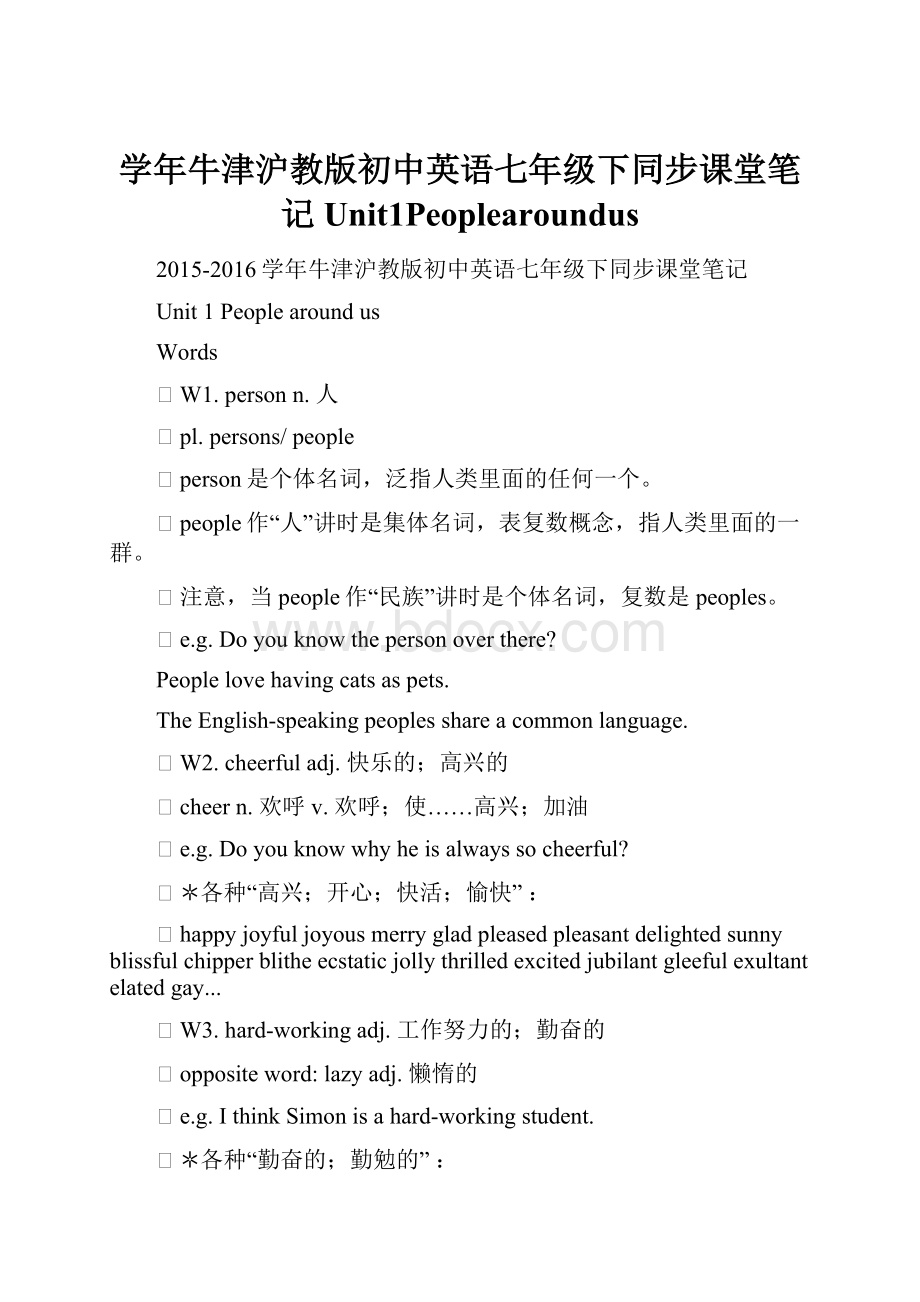 学年牛津沪教版初中英语七年级下同步课堂笔记Unit1Peoplearoundus.docx
学年牛津沪教版初中英语七年级下同步课堂笔记Unit1Peoplearoundus.docx
- 文档编号:27324513
- 上传时间:2023-06-29
- 格式:DOCX
- 页数:18
- 大小:26.86KB
学年牛津沪教版初中英语七年级下同步课堂笔记Unit1Peoplearoundus.docx
《学年牛津沪教版初中英语七年级下同步课堂笔记Unit1Peoplearoundus.docx》由会员分享,可在线阅读,更多相关《学年牛津沪教版初中英语七年级下同步课堂笔记Unit1Peoplearoundus.docx(18页珍藏版)》请在冰豆网上搜索。

学年牛津沪教版初中英语七年级下同步课堂笔记Unit1Peoplearoundus
2015-2016学年牛津沪教版初中英语七年级下同步课堂笔记
Unit1Peoplearoundus
Words
⏹W1.personn.人
⏹pl.persons/people
⏹person是个体名词,泛指人类里面的任何一个。
⏹people作“人”讲时是集体名词,表复数概念,指人类里面的一群。
⏹注意,当people作“民族”讲时是个体名词,复数是peoples。
⏹e.g.Doyouknowthepersonoverthere?
Peoplelovehavingcatsaspets.
TheEnglish-speakingpeoplesshareacommonlanguage.
⏹W2.cheerfuladj.快乐的;高兴的
⏹cheern.欢呼v.欢呼;使……高兴;加油
⏹e.g.Doyouknowwhyheisalwayssocheerful?
⏹✲各种“高兴;开心;快活;愉快”:
⏹happyjoyfuljoyousmerrygladpleasedpleasantdelightedsunnyblissfulchipperblitheecstaticjollythrilledexcitedjubilantgleefulexultantelatedgay...
⏹W3.hard-workingadj.工作努力的;勤奋的
⏹oppositeword:
lazyadj.懒惰的
⏹e.g.IthinkSimonisahard-workingstudent.
⏹✲各种“勤奋的;勤勉的”:
⏹diligentindustriousassiduous...
⏹注意:
hard-working是形容词,workhard是动词词组。
⏹对比:
Heisahard-workingdoctor.
Heworkshardtocurethepatients.
⏹W4.patientadj.耐心的n.病人
⏹oppositeword:
impatientadj.没耐心的
⏹e.g.Mymotheralwaysgoestothatpatientdoctor.
Don’tworry!
Bepatient,please!
Sheismypatientwithlungcancer.
⏹以im-开头的表示否定的词与本词对比:
⏹patient-impatientpossible-impossiblepolite-impoliteperfect-imperfect
⏹W5.smartadj.聪明的;机敏的;时髦的
⏹oppositeword:
foolishadj.笨的;愚蠢的
⏹e.g.Youaresosmart.YoucanfinishthatdifficultMathsprobleminonlyfiveminutes.
ThesmartladyisTina’smother.
⏹✲各种“聪明的”:
⏹cleverintelligentwiseacutetackexquisiteshrewdknowledgeable...
⏹W6.probablyadv.很可能
⏹☞probableadj.可能的;大概的
⏹e.g.Youareprobablyright.
Itwasprobablyhermostpopularsong.
⏹✲各种“很可能;或许;也许”:
⏹maybelikelyperhapspossibly...
⏹W7.forgetv.忘记
⏹☞forget-forgettingforget-forgot-forgotten
⏹oppositeword:
rememberv.记得
⏹☃玩转forget:
⏹forget后接人或事、物,表示“忘记某人/某事/某物”:
⏹e.g.Heforgotthenameofhisprimaryschoolclassteacher.
⏹forget后接todosth表示“忘记去做某事(还没做)”(forgettodosth):
⏹e.g.Don’tforgettoreplytoJaneinthemorning.
⏹forget后接doingsth表示“忘记做过某事(做完了)”(forgetdoingsth):
⏹e.g.HeforgotbuyingthatscarfinParis.
⏹☃玩转remember:
⏹remember后接人或事、物,表示“记得某人/某事/某物”:
⏹e.g.MaryrememberedhermiddleschoolEnglishteacher.
⏹remember后接todosth表示“记得去做某事(还没做)”
⏹(remembertodosth):
⏹e.g.YoushouldremembertoreplytoJaneinthemorning.
⏹remember后接doingsth表示“忘记做过某事(做完了)”
⏹(rememberdoingsth):
⏹e.g.Irememberseeingthemansomewhere.
⏹W8.smelln.气味v.闻;嗅
⏹e.g.Manypeopledon’tlikethesmellofdurians.
⏹☃玩转smell(作动词):
⏹
(1)smell作行为动词时,后面直接跟宾语:
⏹e.g.Smelltheperfume.Doyoulikeit?
⏹
(2)smell作系动词时,后接形容词来修饰主语:
⏹e.g.Themeatsmellsnice,buttastesterrible.
⏹✲各种系动词:
⏹be[am,is,are](状态系动词);keep,rest,remain,stay,lie,stand(持续系动词);seem,appear,look(表象系动词);feel,sound,smell,taste(感官系动词);become,grow,turn,fall,get,go,come,run(变化系动词);prove,turnout(终止系动词)...
⏹W9.caren.照顾v.关心;关注;在乎
⏹e.g.Babydogsandcatsneedalotofcare.
⏹Theonlythinghecaresaboutismoney.
⏹☃玩转care:
⏹carefuladj.仔细的;小心的carelessadj.粗心的;漫不经心的carefullyadv.仔细地;小心地carelesslyadv.粗心地;草率地carefulnessn.仔细;慎重carelessnessn.粗心大意;草率
⏹✲各种care:
⏹
(1)careaboutsth担心/在乎某事e.g.Shedoesn’tcareaboutmoney.
⏹
(2)takecareofsb照顾某人e.g.I’lltakecareofmyself.
⏹(3)careforsb照顾某人(病人)e.g.Shecaredforherfatherinhisdyingyear.
⏹(4)careforsth想要某物e.g.Wouldyoucareforadrink?
⏹(5)caretodosth愿意做某事(用于礼貌性话语)=bewillingtodosthe.g.Wouldyoucaretowaithere,sir?
⏹W10.missv.想念,怀念;错过;过失n.小姐;女士(用于未婚的女性,放在姓之前,要大写)
⏹e.g.Imissmyclassmatesinmyprimaryschool.
⏹Hemissedtheball.
⏹AreyouMissHuang?
⏹W11.joken.玩笑v.说笑话;开玩笑
⏹e.g.Heisfulloffun.Healwaystelljokestomakeuslaugh.
⏹Ididn’tgetthejoke.
⏹Theyarelaughingandjokingtogether.
⏹☃玩转joke:
⏹playajokeonsb开某人玩笑haveajoke说笑话;开玩笑
⏹Areyoujoking(me)?
=Areyoukidding(me)?
你在(和我)开玩笑吗?
⏹W12.laughv.玩笑
⏹☞laughtern.笑;笑声
⏹注意:
laugh中的的gh发/f/音。
⏹e.g.Whyareyoulaughingsohappily?
⏹☃玩转laugh:
⏹laughat嘲笑......laughabout讥笑......laughwith和......一起笑
⏹✲各种“笑”:
⏹smile(微笑)chuckle(咯咯笑)giggle(傻笑)smirk(假笑)titter(窃笑)snigger(暗笑)guffaw(大笑)taunt(嘲笑)deride(嘲笑)chortle(哈哈大笑)cachinnate(哄笑)simper(假笑)roar(狂笑)snicker(偷笑)grin(露齿而笑)ridicule(嘲笑)...
⏹W13.remainv.仍然是;保持不变
⏹
(1)remain通常用作系动词,后面可接名词、形容词、介词短语、分词作表语。
⏹e.g.Peterbecameamanager,butJackremainedaworker.
⏹Iaskedheraquestion,butsheremainedsilent.
⏹Hehadtoremaininhospitaluntilhewasbetter.
⏹Theguestscamein,butsheremainedsittingatthedeskreading.
⏹Asbefore,heremainedunmoved.
⏹
(2)remain也可用作不及物动词,表示“剩下;剩余;遗留”,这种情况不能用进行时态,也没有被动语态。
⏹e.g.Afterthefire,verylittleremainedofhishouse.
⏹(3)remain指“某事有待于以后被处置”时,后面常接不定式的被动形式。
⏹e.g.Manyproblemsremaintobesolved.
⏹(4)remain作名词时表示“剩余物”,一般用其复数形式。
⏹e.g.ThearcheologistsfoundsomeremainsoftheSongDynasty.
⏹(5)remaining和left作为形容词均表示“剩余的”,区别是前者作前置定语,后者作后置定语。
⏹e.g.Therearestillsomeapplesleft.
⏹Iboughtagiftforherwiththeremainingmoney.
⏹W14.strictadj.严格的;严厉的
⏹e.g.She’sverystrictaboutthingslikehomework.
⏹❉玩转strict:
⏹bestrictinsth在某方面严格
⏹bestrictwithsb对某人严格
⏹bestrictaboutsth对某事要求严格
⏹✲各种“严格”:
⏹strict通常用于指对人的行为要求符合规范,一般译为“严格的”;severe多指由于客观需要而不能轻易改变规则和要求,含有冷酷无情之义,一般译为“严厉的”;stern则含有坚定不可动摇之义,多由人的性格所决定,一般译为“严谨的”。
(语气上:
severe>stern>strict)
⏹W15.encouragev.鼓励
⏹e.g.OurPEteacheroftenencouragesustodomoresport.
⏹❉剖析encourage:
⏹encourage本身是由courage延伸出来的,courage作为名词表示“勇气”,加了en-则变成了“给予勇气”,也就是“鼓励”了。
我们来认识几组由en-派生出来的词:
⏹cage-encage把……关在笼子里train-entrain使……上火车plane-enplane使……上飞机title-entitle给(文、书)命名rich-enrich使......富裕able-enable使……能够
⏹encouragesbtodosth鼓励某人做某事
⏹encouragewithsth用……的方式鼓励某人
⏹encouragebyV-ing为……而鼓舞
⏹encouragesbinsth在某方面鼓励某人
⏹W16.supportn.支持v.支持
⏹☞supportern.支持者
⏹e.g.Bettyneedsoursupport.Let’sgiveherahand.
⏹EverybodyelsesaidIwaswrongbutPaulsupportedme.
⏹❉玩转support:
⏹supportin在……方面给予支持supporton支撑在……上supportwith用……支撑supportby靠……得到支持supportsbagainststh支持某人去反对……insupportof支持/证明……
⏹(^o^)各种“支持”:
⏹support指道义上或物质上支持某人,也可指对一项事业的支持或赞助;advocate指通过发表演说或写文章来表示支持、拥护,常暗示提倡某事或为某事辩护;uphold指把快要倒下的东西扶直并撑稳,引申指支持正受到攻击或挑战的某人或某事。
⏹W17.successfuladj.获得成功的
⏹☞successn.成功succeedv.成功successfullyadv.成功地
⏹e.g.Whodoyouthinkisthemostsuccessfulpersonintheworld?
⏹❉玩转successful:
⏹successfulat在……方面成功(侧重在行)successfulin在……方面成功(侧重成功)successfulwith做……(事情)成功
⏹W18.membern.成员;身体部位(尤指胳膊和腿)
⏹☞membershipn.会员资格;会员身份
⏹e.g.Thereareabout30membersintheRobotClub.
⏹W19.paragraphn.段落
⏹☞passagen.文章;篇章sentencen.句子wordn.字;词
⏹e.g.PleasereadParagraph3andfindoutthemainidea.
⏹W20.celebratev.庆祝
⏹☞celebrationn.庆祝;祝贺
⏹e.g.It’syourbirthdaytomorrow,sowemustcelebrate.
⏹W21.giftn.礼物
⏹☞presentn.礼物
⏹e.g.ThetwogirlsalwaysexchangedChristmasgifts.
⏹W22.hugn.拥抱
⏹e.g.Thereareabout30membersintheRobotClub.
⏹✪各种“拥抱”:
⏹hug比较通俗,可表示任何形式的拥抱,可表示因为爱情而“拥抱”,也可表示因友情而“拥抱”;embrace则多指因爱情而“拥抱”;clasp则强调拥抱某一特定的部位,如腰、颈等。
⏹W23.perfectadj.完美的
⏹☞perfectlyadv.完美的
⏹e.g.Heisaperfectgentleman.
Expressions
⏹E1.aswell除......之外;也
⏹E2.telljokes讲笑话
⏹E3.(be)strictabout对……要求严格
⏹E4.gotowork上班
⏹E5.giveup放弃
⏹E6.takecareof照顾;照料
⏹E7.makefunof嘲弄;照料
⏹E8.wearglasses戴眼镜
⏹E9.alldayandallnight夜以继日
⏹E10.begoodat擅长(做)……
Languagepoints
⏹LP1.Shetakestimetohelpherchild.
⏹taketime意思是“花时间”,其后面可跟动词不定式(todo)。
⏹e.g.Taketimetocheckyouranswersbeforeyouhandinyourtestpaper,please.
⏹handin上交(作业、试卷等)
⏹LP2.Grandmatookcareofmyfamily.
⏹takecareof意思是“关心;照顾”;和lookafter意思相近,可相互使用。
⏹e.g.Nursestakecareofpatientsinhospital.
=Nurseslookafterpatientsinhospital.
⏹LP3.Iwillneverforgetthetaste,andthesmellaswell.
⏹aswell与aswellas用法总结:
⏹
(1)aswell:
⏹aswell常用作状语,作“又;也”解,相当于too或also,常位于句末,无须用逗号与句子分开。
⏹e.g. IamgoingtoLondonandmysisterisgoingaswell.
⏹aswell在口语中也可用于句中,作“也好,也行”或“倒不如”解,用来缓和语气。
⏹e.g.Youmayaswellgo.
⏹aswell可以直接用于just后,用作应答语(可视为It‘sjustaswell.的省略),作“幸亏,幸而;无妨;没关系”解。
⏹e.g. —Weweretoolatetoseethefilm.—Justaswell.Ihearitisn'tverygood.
⏹
(2)aswellas:
⏹aswellas常用来连接两个并列的成分,作“也,还”解。
它强调的是前一项,后一项只是顺便提及。
因此连接并列主语时,谓语动词与前一项一致;而用notonly...butalso...连接时,谓语动词与后一项一致。
⏹e.g.Yourwifeaswellasyouisfriendlytome.
⏹aswellas用来表示同级比较,指“一样好”。
⏹e.g.Heplaystheguitaraswellasyou.
⏹LP4.Sheoftentellsmejokestomakemelaugh,butshenevermakesfunofothers.
⏹
(1)telljokes意思是“开玩笑”,与haveajoke意思相近,但前者可用tellsbjokes表达,后者只能用haveajokewithsb来表达。
⏹e.g.Sheoftentellsmejokes.=Sheoftenhaveajokewithme.
⏹
(2)makesbdosth意思是“使某人做某事”。
make后跟动词不定式时,to要省略。
⏹e.g.Theteachermadethestudentsdoalotofhomework.
⏹(3)makefunof意思是“嘲弄;取消”,与laughat意思相近。
⏹e.g.Theolderchildrenalwaysmakefunofhimbecauseofhisaccent.
⏹=Theolderchildrenalwayslaughathimbecauseofhisaccent.
⏹LP5.Ihopewewillalwaysremainfriends.
⏹remainfriends意思是“还是朋友;保持朋友关系”。
⏹e.g.Youmusttellmethetruth,ifwearetoremainfriends.
⏹LP6.Hisclassesarealwaysfulloffun.
⏹
(1)befullof意思是“充满……;装满……”,同义词组是befilledwith。
⏹e.g.Thebottleisfullofmilk.=Thebottleisfilledwithmilk.
⏹
(2)fun在这里作名词使用,意思是“乐趣;欢乐”;fun亦可以用作形容词,意思是“有趣的;使人欢乐的”。
这句话可以简化为:
Hisclassesarealwaysfun.
⏹LP7.Heuseslotsofgamesinhisteaching.
⏹
(1)lotsof和alotof一样,意思是“许多;很多”,后面可接可数名词或不可数名词。
如果使用many(alargenumberof)或much(alargeamountof)来表达“许多;很多”的话,注意many(alargenumberof)后只能接可数名词,much(alargeamount
- 配套讲稿:
如PPT文件的首页显示word图标,表示该PPT已包含配套word讲稿。双击word图标可打开word文档。
- 特殊限制:
部分文档作品中含有的国旗、国徽等图片,仅作为作品整体效果示例展示,禁止商用。设计者仅对作品中独创性部分享有著作权。
- 关 键 词:
- 学年 牛津 沪教版 初中英语 年级 下同 课堂 笔记 Unit1Peoplearoundus
 冰豆网所有资源均是用户自行上传分享,仅供网友学习交流,未经上传用户书面授权,请勿作他用。
冰豆网所有资源均是用户自行上传分享,仅供网友学习交流,未经上传用户书面授权,请勿作他用。


 《崔万志演讲观后感》.docx
《崔万志演讲观后感》.docx
